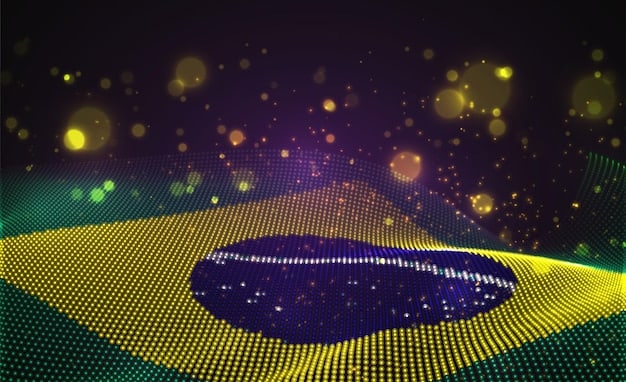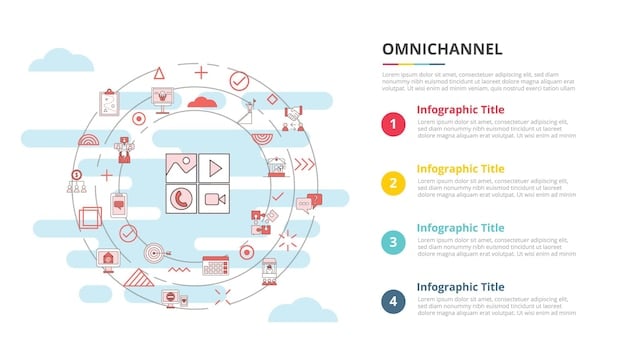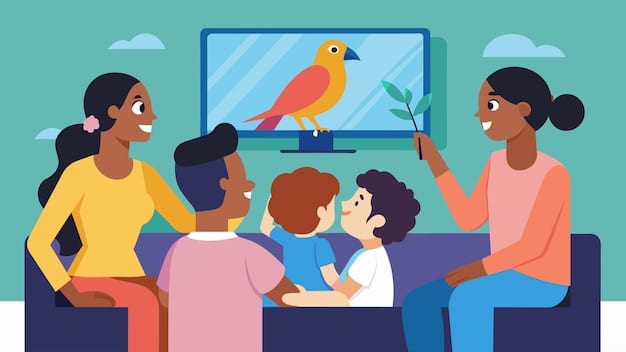Streaming and the Law: Copyright & Piracy in Brazil

Streaming in Brazil navigates a complex legal landscape where consumer access to content clashes with robust copyright protections and the persistent challenge of piracy, demanding a balance between innovation and legal compliance.
In the evolving digital landscape, understanding the intricate relationship between streaming and the law: understanding copyright and piracy issues in Brazil has become paramount for content creators, distributors, and consumers alike. The rapid expansion of streaming platforms has reshaped how we access entertainment, yet it has simultaneously brought to light a complex web of legal challenges, particularly concerning intellectual property and the pervasive issue of piracy.
The rise of streaming and its legal implications in Brazil
The dawn of the streaming era marked a transformative shift in media consumption worldwide, and Brazil was no exception. From humble beginnings, often characterized by limited bandwidth and nascent platforms, streaming services have exploded in popularity, fundamentally altering how Brazilians engage with movies, TV shows, music, and even live events. This meteoric rise, while beneficial for consumer choice and content accessibility, rapidly introduced a new set of legal challenges that traditional media laws were ill-equipped to handle.
Initially, copyright laws in Brazil, much like in many other nations, were primarily designed for tangible forms of media: physical copies, broadcasts, and public performances. The fluid, on-demand nature of streaming content posed novel questions about distribution rights, territorial licensing, and the very definition of “publication” or “performance” in a digital realm. This necessitated a re-evaluation and adaptation of existing legal frameworks to accommodate the unique characteristics of streaming technology.
Evolution of copyright law in Brazil for digital content
Brazilian copyright law, primarily governed by Law No. 9,610/98 (the Brazilian Copyright Law), has undergone significant scrutiny and partial adaptation in response to digital media. While the core principles of protecting authors’ rights remain, their application to the internet and streaming services has been a continuous area of debate and judicial interpretation.
- Author’s Rights: The law grants authors exclusive moral and economic rights over their works, including the right of reproduction, distribution, public performance, and communication to the public. For streaming, the “communication to the public” right is particularly relevant, ensuring that content creators control when and how their works are made available online.
- Licensing and Contracts: Streaming platforms operate through complex licensing agreements with content owners. These contracts define the scope of use, territorial restrictions, duration, and remuneration, embodying the practical application of copyright law in the streaming ecosystem.
- Digital Millennium Copyright Act (DMCA) Parallels: While Brazil does not have a direct equivalent to the DMCA, notions of “safe harbor” for internet service providers (ISPs) and platforms, which limit their liability for user-generated content, are increasingly discussed and partially applied through judicial decisions, though typically with more stringent requirements than in the U.S.
The Brazilian legal system has sought to balance these rights with the public’s access to information and culture, a delicate act that continues to evolve. Recent legislative proposals and ongoing judicial cases reflect a broader effort to modernize these laws, ensuring they remain relevant in an era dominated by instant digital access.
The complexity is further compounded by the global nature of streaming. Content often originates in one country, is licensed globally, and consumed in another, creating scenarios where the interpretation and enforcement of copyright law can vary significantly across jurisdictions, demanding international cooperation and clearer global standards for digital rights management.
Copyright law in Brazil: key principles and their application to streaming
Understanding the bedrock of copyright law in Brazil is crucial to grasping the legal challenges and frameworks governing streaming. Brazilian copyright law extends comprehensive protection to intellectual works, ensuring creators retain control over their creations. This foundational principle is then applied, often with significant nuances, to the digital realm of streaming.
At its core, Brazilian copyright law, codified primarily in Law No. 9,610/98, protects “intellectual works” of an artistic, literary, or scientific nature. This protection is automatic upon creation, meaning formal registration is not mandatory for rights to exist, though it offers evidentiary benefits. These rights are broadly categorized into moral rights and economic rights.
Moral rights vs. economic rights in streaming content
- Moral Rights: These are inalienable and perpetual rights linked directly to the author. They include the right to claim authorship (paternity), to have one’s name appear on the work, to ensure the integrity of the work (preventing modifications that could harm the author’s reputation), and to withdraw the work from circulation. In streaming, moral rights ensure that even when a work is licensed for distribution, the original creator is recognized and their artistic integrity is protected. For instance, a streaming platform cannot edit a film significantly without the director’s consent if it harms the original work’s essence.
- Economic Rights: These are transferable rights that allow the author to exploit their work financially. They encompass reproduction, distribution, public performance, translation, adaptation, and communication to the public. For streaming services, the “communication to the public” right is paramount. This right empowers content owners to authorize or prohibit their works from being made available to the public via digital means, including on-demand streaming. Licensing agreements with platforms are direct manifestations of these economic rights in action.
The application of these principles to streaming means that every film, series, song, or documentary available on a legitimate streaming platform has typically gone through a rigorous process of licensing, where economic rights are granted to the platform for a specific period and territory. This ensures the artists and rights holders are compensated for their work.
Specific legal provisions impacting streaming agreements
Brazilian law also contains provisions that specifically influence how streaming agreements are structured:
- Territoriality: Copyright protection in Brazil is primarily territorial. This means that rights granted in Brazil are typically enforced within its borders. Streaming services, being global, often acquire rights on a territorial basis, leading to “geo-blocking” where content is only available in specific regions where licenses have been secured.
- Fair Use (or “Free Use”): While Brazil does not have a broad “fair use” doctrine like the United States, its law includes specific exceptions and limitations to copyright, often referred to as “free uses.” These permit certain uses of copyrighted material without permission or payment, such as for educational purposes, criticism, or news reporting, provided they do not unduly prejudice the author’s legitimate interests. The interpretation of these exceptions in the context of digital content and user-generated content on streaming platforms is an ongoing area of legal development.
- Collective Management: For certain types of works, particularly music, collective management organizations (CMOs) play a significant role. These entities, like ECAD (Central Office for Collection and Distribution), manage the collection and distribution of royalties for public performance and broadcasting rights. Streaming platforms often sign agreements with these CMOs to cover the vast catalog of music they offer.

The continuous tension between protecting intellectual property rights and enabling the free flow of information in a digital age shapes the legal discourse around streaming. As technology advances, so too must the interpretations and applications of these fundamental copyright principles, ensuring that justice is served for both creators and consumers in the dynamic Brazilian market.
The shadowy side: piracy of streaming content in Brazil
While streaming has revolutionized content consumption, it has concurrently fueled the illicit industry of content piracy. In Brazil, this shadow economy thrives, posing significant economic and legal challenges to content creators, legitimate streaming platforms, and the overall creative industry. Piracy, in essence, is the unauthorized reproduction, distribution, or performance of copyrighted works, and in the streaming context, it manifests in various forms.
The Brazilian landscape for content piracy is diverse, ranging from illegal streaming sites that host unauthorized content to social media groups sharing pirated links, and even sophisticated “pirate boxes” that offer illicit access to a plethora of channels and platforms at a fraction of the cost of legitimate services. The sheer scale and accessibility of these pirated options make combatting them a formidable task.
Forms of streaming piracy prevalent in Brazil
Several methods are commonly used to facilitate streaming piracy in Brazil:
- Illegal Streaming Websites and Apps: These platforms host entire libraries of movies, TV shows, and live events, often new releases, without acquiring any licensing rights. They typically generate revenue through intrusive advertising or by soliciting donations.
- IPTV Piracy: Illicit Internet Protocol Television (IPTV) services offer subscriptions to hundreds or thousands of channels, including premium sports, movies, and series, bypassing traditional cable or satellite providers and legitimate streaming platforms. These services often leverage a combination of legitimate content re-streaming and direct copying.
- Social Media and Messaging Apps: Platforms like WhatsApp, Telegram, and Facebook groups are frequently used to share links to pirated content, coordinate illegal streams, and distribute login credentials for legitimate services.
- “Gatonet” or “TV Box” Devices: These devices, often referred to by their popular names like “Gatonet,” are Android-based TV boxes pre-configured to access pirated IPTV channels and streaming content. They are widely sold and used, representing a major challenge for regulatory bodies and rights holders.
The appeal of piracy is largely driven by cost and convenience. For many consumers, the promise of free or significantly cheaper access to a vast array of content outweighs the ethical and legal implications. The perception of high subscription costs for multiple legitimate streaming services also contributes to this trend, pushing some users towards illicit alternatives.
Legal consequences for consumers and distributors of pirated content
Brazilian law treats copyright infringement as a serious offense, with both civil and criminal consequences for those involved in piracy, whether as distributors or, in some cases, as consumers. While the focus of law enforcement is primarily on large-scale distributors and operators of pirated services, consumers are not entirely immune.
- Criminal Penalties: Article 184 of the Brazilian Penal Code addresses copyright infringement, with penalties ranging from detention to imprisonment (up to four years) and fines for those who reproduce, distribute, or make available to the public, without authorization, intellectual works. While the most severe penalties are reserved for those who profit from piracy, mere reproduction for personal gain can also lead to legal consequences.
-
Civil Penalties: Rights holders can pursue civil lawsuits against infringers to seek injunctions to stop the illegal activity and demand compensation for damages incurred due to the infringement. This often involves lost profits and potential moral damages. These civil actions can target individuals or entities involved in the piracy chain.
-
Enforcement Challenges: Despite strong legal provisions, enforcement remains challenging. The borderless nature of the internet, the anonymity it can provide, and the sheer volume of pirated content make it difficult for authorities to identify and prosecute all infringers effectively. There is also a significant public awareness gap regarding the illegality and ethical implications of consuming pirated content.
The fight against streaming piracy in Brazil is a multi-faceted battle involving legislative efforts, technological solutions, user education, and consistent enforcement actions. It requires collaboration between government bodies, law enforcement, content owners, and legitimate streaming platforms to create an ecosystem where intellectual property is respected and legally acquired content prevails.
Enforcement mechanisms and challenges in Brazil
Effectively combating streaming piracy and enforcing copyright law in the vast digital landscape of Brazil presents a unique set of challenges. While the legal framework is in place, the practicalities of identification, prosecution, and prevention are complex. Brazilian authorities and rights holders employ various mechanisms, but they frequently encounter hurdles ranging from technological sophistication of pirates to jurisdictional complexities.
The scale of the internet makes tracking and identifying infringers a monumental task. Pirate operations can be globally distributed, with servers in one country, content hosted in another, and operators residing elsewhere, making cross-border enforcement an intricate legal dance. Moreover, the rapid evolution of technology means that as soon as one piratical method is shut down, new ones emerge, requiring constant adaptation from law enforcement.
Government bodies and industry initiatives against piracy
In Brazil, several entities are involved in the fight against digital piracy:
- ANATEL (National Telecommunications Agency): ANATEL, while primarily a regulatory body for telecommunications, has been increasingly involved in combating illegal IPTV and “gatonet” devices. They have launched operations to block IP addresses associated with illicit streaming and to seize and destroy pirated devices. Their focus is on ensuring compliance with telecommunications regulations, which often overlap with copyright infringement in digital content distribution.
- Federal Police (Polícia Federal) and Civil Police (Polícia Civil): These law enforcement agencies conduct investigations, raids, and arrests related to large-scale piracy operations. They work in conjunction with rights holders to identify and dismantle organized crime networks involved in content theft.
-
Ministry of Justice and Public Security: The Ministry plays a role in formulating policies and coordinating efforts across different agencies to combat piracy and cybercrime. They often launch national campaigns to raise awareness about the risks and illegality of piracy.
-
Industry Associations: Organizations like the Motion Picture Association (MPA), anti-piracy associations, and local content producers’ unions actively work to protect their members’ intellectual property. They conduct investigations, gather evidence, and collaborate with law enforcement to initiate legal proceedings against infringers. They also run public awareness campaigns.
These initiatives frequently involve international cooperation, as many pirated content networks span multiple countries. Brazilian authorities often collaborate with Interpol, international police forces, and global anti-piracy organizations to tackle these cross-border crimes.
Technological and legal challenges to effective enforcement
Despite these efforts, significant challenges persist:
- Technological Sophistication: Pirates constantly develop new methods to evade detection, from using VPNs and encrypted messaging services to rapidly changing IP addresses and server locations. This cat-and-mouse game requires sophisticated technological countermeasures from enforcement agencies.
- “Whack-a-Mole” Problem: Shutting down one pirated website or service often leads to the immediate emergence of several others. The decentralized nature of many piratical operations makes it difficult to completely eradicate them.
- Judicial Process and Slow Procedures: The Brazilian judicial system, while robust, can be slow. Obtaining court orders for takedowns, blocking measures, or search warrants can be time-consuming, allowing pirates to continue their operations or relocate.
-
Public Awareness and Demand: A major challenge is the lingering public demand for free content and a lack of understanding regarding the illegality and harm caused by piracy. Unless consumer behavior shifts, the market for pirated content will continue to exist.
-
Jurisdictional Issues: When content is streamed from servers outside Brazil, legal action becomes complicated, requiring international legal assistance treaties and multilateral cooperation, which can be cumbersome.
Ultimately, sustained enforcement in Brazil demands a multi-pronged approach that combines legal rigor with technological innovation, international collaboration, and extensive public education campaigns. It’s a continuous battle to ensure that intellectual property rights are upheld in the fast-paced world of digital streaming.
The impact of piracy on Brazil’s creative economy
The rampant issue of streaming piracy in Brazil casts a long and detrimental shadow over the nation’s creative economy. Far from being a victimless crime, content piracy siphons revenue, stifles innovation, and undermines the very ecosystem that supports artists, film producers, musicians, and the vast workforce dependent on the entertainment industry. The cumulative effect is a significant economic drain and a disincentive for future investments in Brazilian creative talent and content production.
When consumers access content illegally, the financial flows that would otherwise go to rights holders, production companies, and individual artists are diverted. This directly impacts their ability to fund new projects, pay their employees, and invest in talent development. The economic damage extends beyond direct revenue loss, affecting a wider chain of related industries, from technical crews and visual effects artists to marketing agencies and concession stand workers at cinemas.
Financial losses and job displacement
The scale of financial loss due to content piracy in Brazil is staggering. Studies by industry associations consistently show multi-million or even billion-dollar losses annually across various sectors, including film, television, music, and software. These losses represent:
- Lost Revenue for Rights Holders: This is the most direct impact, as subscriptions that would have gone to legitimate platforms or ticket sales for movies are foregone.
- Reduced Investment in New Content: With lower returns on investment due to piracy, content creators and production houses are less likely to invest in ambitious new projects, especially local productions, leading to fewer Brazilian stories being told and fewer opportunities for local talent.
- Tax Revenue Loss: Piracy operates outside the legal economy, meaning no taxes are paid on illicit transactions. This results in significant tax revenue losses for the government, impacting public services and infrastructure.
- Job Losses and Stifled Job Creation: A struggling creative economy translates directly into fewer jobs for actors, directors, writers, technicians, editors, and countless others involved in content creation and distribution. Companies may reduce staff or simply not expand, leading to widespread job displacement and hindering fresh talent from entering the industry.
The music industry, for instance, has historically suffered immensely from piracy, though the rise of legitimate streaming services has helped somewhat in recent years. However, video piracy, particularly through illegal IPTV and “gatonet” boxes, continues to be a major threat to the film and TV sectors.
Impact on innovation and local content creation
Beyond the immediate financial implications, piracy has a chilling effect on innovation and the creation of local content:
- Discouragement of Investment: Why invest in high-quality, expensive productions if they are immediately pirated and revenue is significantly diminished? This makes Brazil a less attractive market for both domestic and international content investors.
- Reduced Risk-Taking: Content creators become less inclined to experiment with new genres, formats, or niche stories if the financial returns are uncertain due to piracy. This leads to a more homogenous content landscape, limiting diverse cultural expressions.
- Undermining Intellectual Property Rights: Pervasive piracy sends a message that intellectual property is not valued or adequately protected, eroding confidence in the legal system and discouraging creative endeavors.
- Hindrance to Market Development: The proliferation of pirated alternatives makes it harder for legitimate, often nascent, streaming services to establish themselves and grow in the Brazilian market. This limits consumer choice in the long run and hampers healthy market competition.
In essence, widespread streaming piracy creates a vicious cycle: less revenue leads to less investment, which leads to less original content, fewer jobs, and ultimately a less vibrant and competitive creative economy. Addressing this issue is not just about protecting corporate profits; it’s about safeguarding cultural heritage, fostering artistic expression, and ensuring economic prosperity for thousands of Brazilians involved in the creative industries.
Future outlook: legislative efforts and technological solutions
The dynamic interplay between streaming, copyright, and piracy in Brazil demands constant adaptation and forward-thinking strategies. As technology evolves at an unprecedented pace, so too must the legal frameworks and enforcement mechanisms designed to protect intellectual property. Looking ahead, the future of this landscape in Brazil will likely be shaped by ongoing legislative efforts to modernize laws and the deployment of increasingly sophisticated technological solutions to combat piracy.
There is a growing recognition within the Brazilian government and industry that current regulations, while foundational, may not always be sufficient to address the complexities of digital content distribution and global piracy networks. This has spurred discussions and proposals aimed at strengthening copyright enforcement and providing clearer guidelines for the digital realm.
Proposed legislative changes and policy discussions
Several legislative initiatives and policy discussions are underway or anticipated in Brazil that could impact the streaming and copyright landscape:
- Revisions to Copyright Law: While a complete overhaul of Law No. 9,610/98 remains a complex undertaking, specific amendments are often proposed to address digital challenges. These might include clearer definitions of “digital communication to the public,” expanded liability for online platforms, or more streamlined processes for content takedowns.
- Regulation of Digital Platforms: Discussions around regulating large digital platforms (social media, aggregators, etc.) are gaining traction. Such regulations might impose greater responsibility on platforms for content hosted or shared through their services, potentially affecting how pirated content is disseminated.
- Strengthening Anti-Piracy Measures: Legislative proposals might focus on enhancing the powers of regulatory bodies like ANATEL to block access to pirated services more swiftly and directly, as well as increasing penalties for commercial piracy operations.
- International Agreements: Brazil’s participation in international treaties and agreements related to intellectual property will continue to shape its domestic laws, particularly in areas like cross-border data sharing and mutual assistance in piracy investigations.
These policy discussions reflect a careful balancing act: protecting creators’ rights without stifling digital innovation or imposing undue burdens on internet service providers and legitimate platforms. The goal is to create a predictable and fair legal environment that encourages investment in content and protects consumers, while also maintaining a robust fight against illegal activities.
Technological advancements in content protection and anti-piracy
Beyond legal measures, technology itself offers powerful tools in the fight against piracy:
- Digital Rights Management (DRM): DRM technologies are continuously evolving to make it more difficult to illegally copy, distribute, or access copyrighted streaming content. This includes encryption, watermarking, and other techniques to control usage.
- AI and Machine Learning for Detection: Artificial intelligence and machine learning algorithms are increasingly used to scan the internet for pirated content, identify illicit streams, and automate takedown requests. These systems can process vast amounts of data more efficiently than human analysts.
- Blockchain Technology: While still in nascent stages for mainstream content, blockchain offers potential for secure content distribution and transparent rights management, making it harder for unauthorized copies to circulate.
- Enhanced Forensic Watermarking: This technology embeds invisible identifiers into content, allowing rights holders to trace the source of a leak or pirated copy, even if it’s re-recorded or re-streamed. This helps in identifying the initial point of infringement.
- CDN and Edge Security: Content Delivery Networks (CDNs) and advanced edge security solutions are crucial in preventing unauthorized access points and securing the delivery of legitimate streams, making it harder for pirates to capture and re-distribute content.
The future of combating streaming piracy in Brazil will depend on a synergistic approach: a modernized legal and regulatory framework that empowers enforcement, coupled with cutting-edge technological solutions that make piracy more difficult and less profitable. Educating the public about the value of legitimate content and the harm caused by piracy will also remain a critical component in shaping a more compliant digital ecosystem.
Consumer awareness and responsible streaming
In the intricate landscape of streaming and copyright in Brazil, the role of the consumer is paramount. While legal frameworks and enforcement mechanisms address the supply side of piracy, consumer awareness and responsible streaming habits are crucial for curbing demand. A well-informed public, understanding the implications of their choices, can significantly contribute to fostering a healthy and sustainable creative economy.
Many consumers engage with pirated content without fully grasping the legal ramifications or the societal harm it causes. The perception that online piracy is a “victimless crime” or simply a “way to save money” is widespread, highlighting a significant gap in public education. Bridging this gap is essential for shifting cultural norms and promoting ethical consumption of digital media.
Educating the public about the value of legitimate content
Effective public awareness campaigns are vital to highlight the benefits of engaging with legitimate streaming services and the detriments of piracy. Key messages should include:
- Supporting Creators: Legitimate streaming platforms ensure that artists, musicians, filmmakers, and the countless individuals involved in content production are fairly compensated for their work. This directly fuels the creation of new and diverse content.
- Quality and Reliability: Legitimate services offer superior streaming quality, reliable availability, and often exclusive content that pirated sites cannot consistently match. They also provide secure access, free from malware or viruses often associated with illicit sites.
- Ethical Consumption: Emphasizing the ethical obligation to respect intellectual property rights, akin to respecting physical property, can help change perceptions.
- Legal Risks: While the focus is often on large-scale distributors, consumers engaging in certain forms of piracy (e.g., sharing content, using illicit “pirate boxes”) can face legal consequences, including fines and, in severe cases, criminal charges. Awareness of these risks serves as a deterrent.
- Economic Impact: Explaining how piracy damages the national creative economy, leading to job losses, reduced investment, and fewer local productions, can help consumers understand the broader societal cost.
These campaigns can be carried out by government agencies, industry associations, and even legitimate streaming platforms themselves, leveraging various media channels to reach a broad audience.
The role of affordable and accessible legal streaming options
While education is crucial, affordability and accessibility of legitimate content are equally important drivers of responsible streaming. If legal alternatives are prohibitively expensive or difficult to access, consumers may be pushed towards pirated options by necessity or convenience.
- Competitive Pricing: Legitimate streaming services must offer competitive pricing, potentially with tiered subscription plans or bundled packages, to attract and retain subscribers.
- Variety and Local Content: A diverse catalog that includes not only international blockbusters but also a strong selection of local Brazilian content is essential to cater to public demand and provide a compelling alternative to illicit sites.
- User-Friendly Platforms: Easy-to-use interfaces, reliable streaming quality, and broad device compatibility enhance the user experience on legitimate platforms, making them more attractive than often clunky or ad-laden pirated sites.
- Content Availability: Ensuring timely release of popular content on legitimate platforms, especially new movies and series, can reduce the incentive for consumers to seek out pirated versions that appear faster.

Ultimately, a holistic approach to promoting responsible streaming in Brazil involves a combination of robust legal enforcement, continuous public education, and the sustained provision of high-quality, affordable, and easily accessible legitimate content. Empowering consumers with knowledge and viable choices is a powerful tool in transforming the digital content landscape for the better.
| Key Point | Brief Description |
|---|---|
| ⚖️ Copyright Law Basics | Brazilian Law 9,610/98 protects creative works, granting moral (inalienable) and economic (transferable) rights to authors, crucial for licensing. |
| 🏴☠️ Piracy Forms & Challenges | Piracy includes illegal streaming, IPTV, “gatonet” devices, and social media sharing; enforcement is complex due to tech and global scale. |
| 💰 Economic Impact | Piracy causes significant financial losses, reduces investment in local content, and leads to job displacement in Brazil’s creative industries. |
| 🚀 Future Outlook | Future efforts involve legislative updates, advanced technological solutions (AI, DRM), and consumer education to combat piracy. |
Frequently Asked Questions
▼
The primary legal framework for intellectual property protection in Brazil, including streaming content, is Law No. 9,610/98, commonly known as the Brazilian Copyright Law. This law outlines the moral and economic rights of authors over their creations, extending protection to various forms of artistic, literary, and scientific works, thereby governing how digital content is licensed and distributed.
▼
While the enforcement focus is primarily on large-scale distributors and operators of pirated services, consumers are not entirely exempt from legal consequences. Article 184 of the Brazilian Penal Code addresses copyright infringement, with penalties for unauthorized reproduction or distribution. While direct prosecution of individual consumers for mere viewership is less common, active participation in sharing or profiting from pirated content can lead to civil and even criminal charges.
▼
Geo-blocking is directly related to the territoriality principle of Brazilian copyright law. Content licenses obtained by streaming platforms are often limited to specific geographic regions. Therefore, geo-blocking ensures that content is only available in Brazil (or other licensed territories) and not in regions where the platform does not hold the necessary broadcasting or distribution rights, complying with licensing agreements and copyright protections.
▼
“Gatonet” or “TV Box” devices are Android-based set-top boxes, often pre-configured to access illegal IPTV channels and pirated streaming content. They are illegal because they bypass legitimate subscriptions and distribution channels, providing unauthorized access to copyrighted material. Their use constitutes copyright infringement and can lead to legal action against distributors and, in some cases, users for facilitating piracy.
▼
Brazil employs a multi-faceted approach to combat streaming piracy. This includes legislative efforts to adapt copyright laws for the digital age, active enforcement by bodies like ANATEL and the Federal Police against illicit services, and collaboration with industry organizations. Furthermore, there’s a growing emphasis on technological solutions like advanced DRM and AI-driven content detection, alongside public awareness campaigns to educate consumers about legitimate content consumption.
Conclusion
The intricate dance between streaming services, copyright law, and the persistent challenge of piracy in Brazil underscores a complex digital reality. While the surge of streaming has brought unprecedented access to content, it has simultaneously illuminated the critical need for a robust and adaptive legal framework to protect creators’ rights. Efforts by the Brazilian government, law enforcement, and industry stakeholders to combat piracy are commendable, yet the fight against illicit content distribution remains an ongoing battle against technological innovation used for illicit purposes and prevailing consumer demand for free access. Ultimately, a sustainable digital ecosystem in Brazil hinges on a synergistic approach: continuous refinement of copyright legislation, deployment of cutting-edge anti-piracy technologies, and, crucially, a shift in consumer behavior driven by increased awareness of the economic and ethical implications of piracy, fostering a culture that truly values and supports the creative economy.





